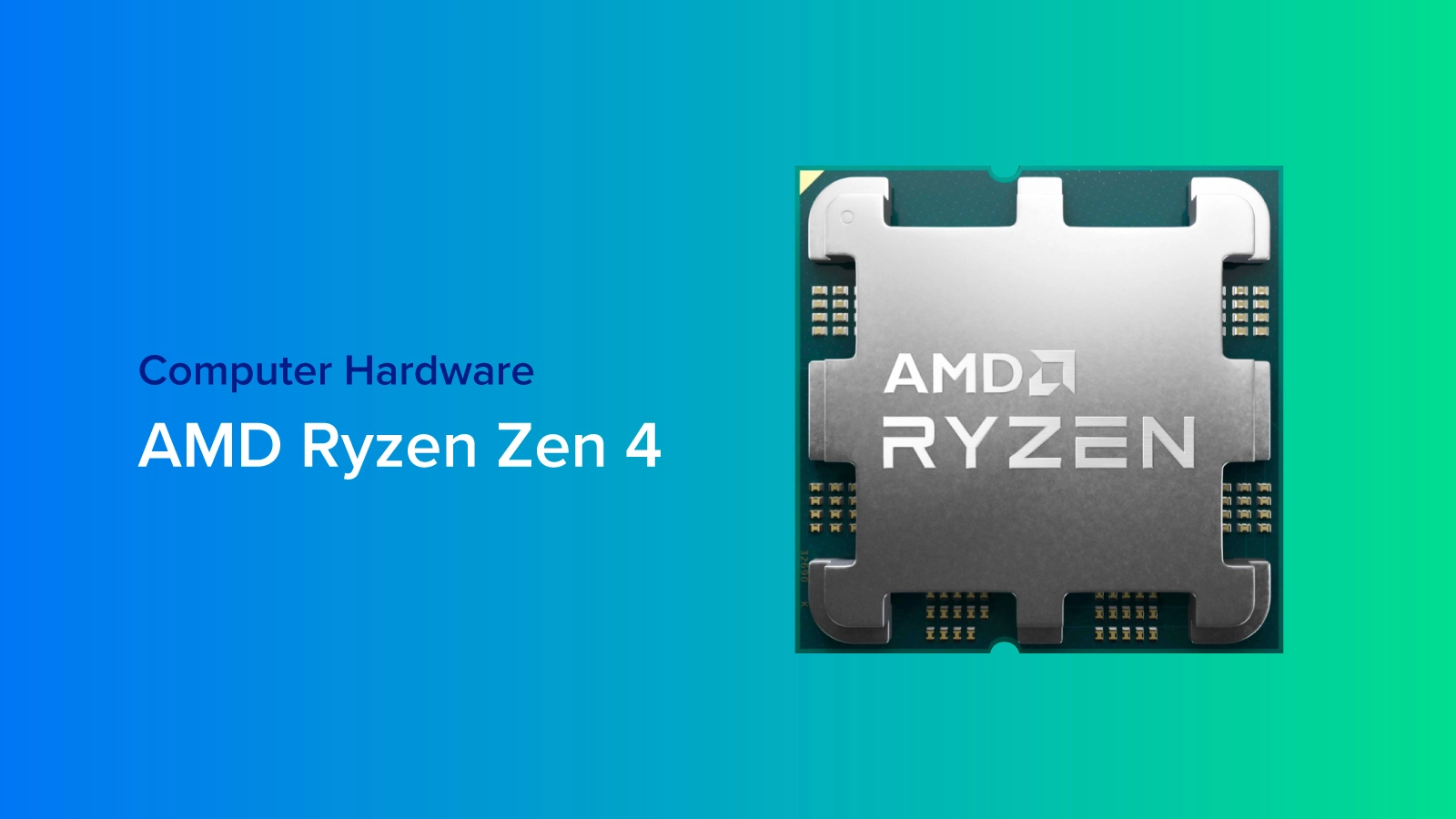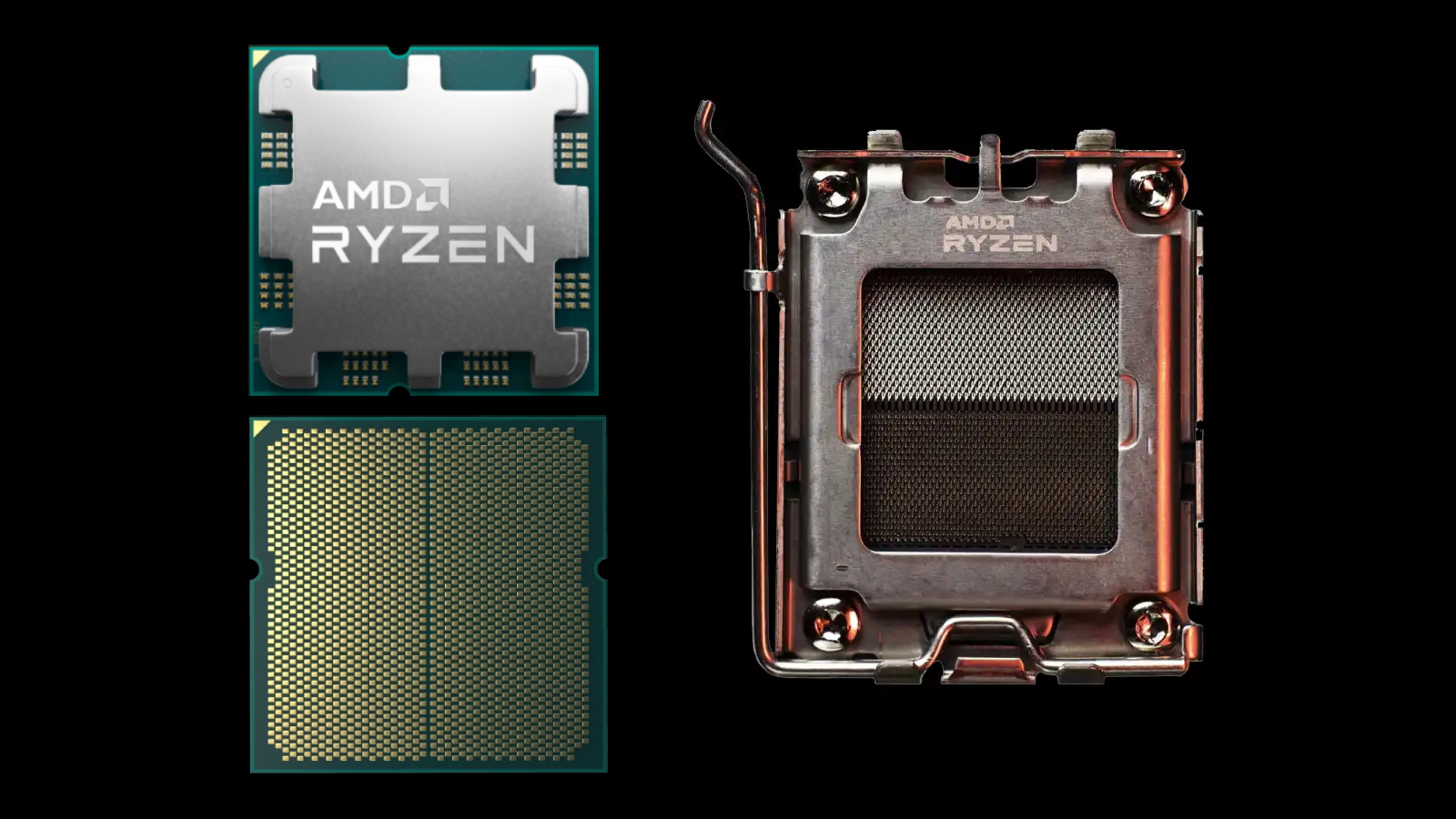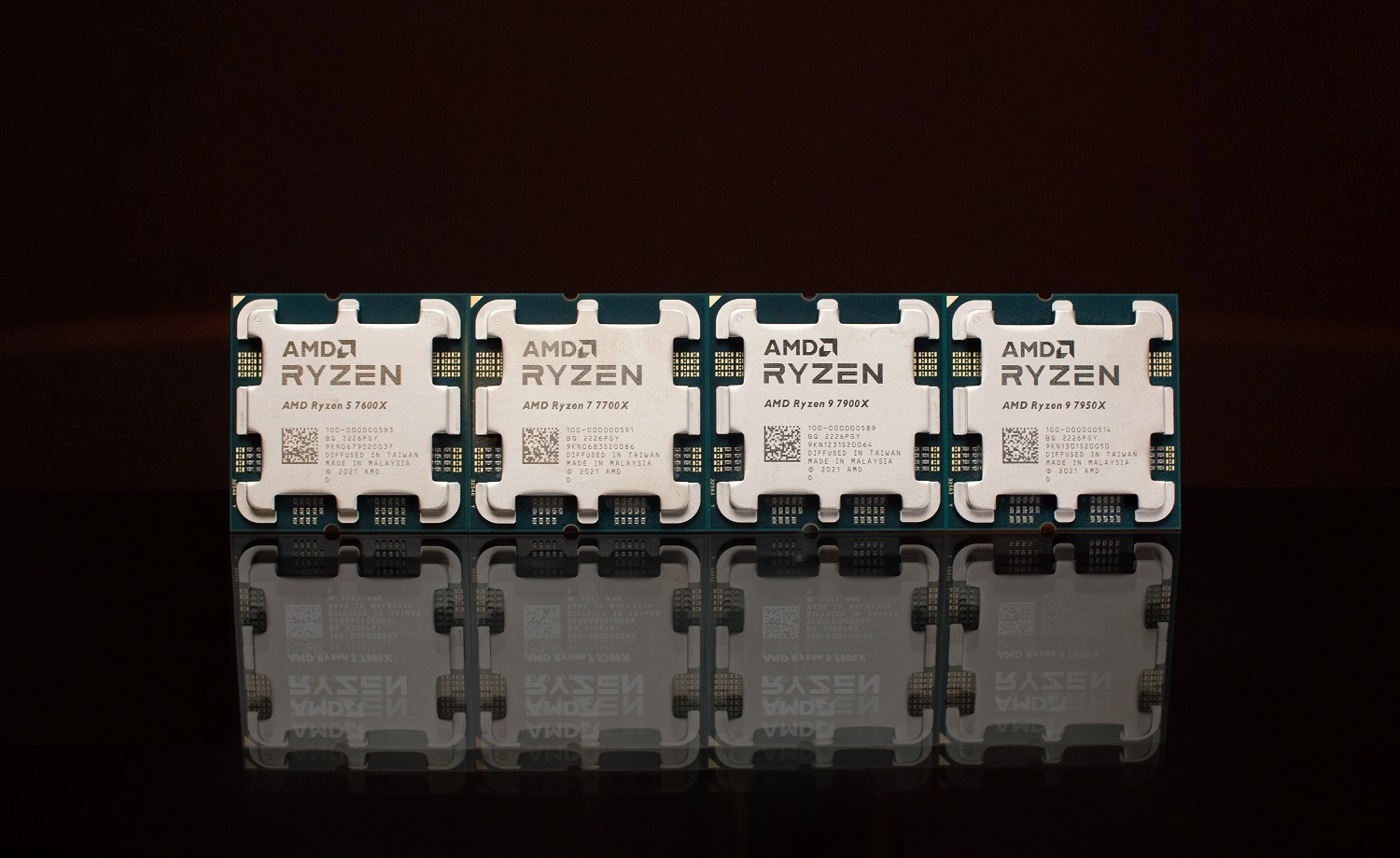
The AMD Ryzen 7000 processors are released today, September 27, 2022, and AMD claims this processor changes everything. They changed a lot in this generation and for good reason. They are built on the new Zen 4 architecture, the first 5nm desktop processor by TSMC. They have stuffed so much on this CPU that the IHS (internal heat spreader) has a skeletal design for the SMDs/resistors/capacitors that leak and spill to the edges of the CPU. AMD's advancements in the 7000 series processors are the most advanced gaming and creative 5nm desktop processor to date.
Ryzen 7000 Pricing
The Ryzen 7000 CPU MSRP is actually cheaper than their 2-year-old Ryzen 5000 MSRP. With new generations of components always having a small markup, it’s refreshing to see AMD retain and even lower pricing.
7000 Series | Price | 5000 Series | Price |
|---|---|---|---|
Ryzen 9 7950X | $700 ⬇ | Ryzen 9 5950X | $800 |
Ryzen 9 7900X | $550 | Ryzen 9 5900X | $550 |
Ryzen 7 7700X | $400 ⬇ | Ryzen 7 5800X | $450 |
Ryzen 5 7600X | $300 | Ryzen 5 5600X | $300 |
Their pricing for their CPUs is extremely competitive with the competition. The Ryzen 9 5950X was pretty high in MSRP so it was hard to justify that pricing as opposed to other CPUs. Their price adjustments are a welcome addition to their Zen 4 processors.
Difference Between Ryzen 5000 and Ryzen 7000
Ryzen 7000 offers an increase in base and boost clock speeds over the Ryzen 5000, delivering stronger performance per core at a higher TDP. Let’s look at the specs:
Cores Threads | Boost | Base | Cache | TDP | |
|---|---|---|---|---|---|
Ryzen 9 5950X | 16C/32T | 4.9GHz | 3.4GHz | 64MB | 105W |
Ryzen 9 5900X | 12C/24T | 4.8GHz | 3.7GHz | 64MB | 105W |
Ryzen 7 5800X | 8C/16T | 4.7GHz | 3.8GHz | 32MB | 105W |
Ryzen 5 5600X | 6C/12T | 4.6GHz | 3.7GHz | 32MB | 105W |
Cores Threads | Boost | Base | Cache | TDP | |
|---|---|---|---|---|---|
Ryzen 9 7950X | 16C/32T | 5.7GHz | 4.5GHz | 80MB | 170W |
Ryzen 9 7900X | 12C/24T | 5.6GHz | 4.7GHz | 76MB | 170W |
Ryzen 7 7700X | 8C/16T | 5.4GHz | 4.5GHz | 40MB | 105W |
Ryzen 5 7600X | 6C/12T | 5.3GHz | 4.7GHz | 38MB | 105W |
AMD has broken the 5.0GHz barrier with fashion. The Ryzen 7000 series squeezed a ton of performance out of their CPUs adding almost an additional 1GHz to all their models.
Socket and Support
AMD has departed from the AM4 PGA socket (pin grid array, where physical pins were on the CPU) and adopted LGA in the AM5 socket (land grid array, where the pins are on the motherboard). The physical dimensions of the AMD 7000 series will remain the same and will have compatibility with previous generation coolers. the AMD Ryzen 7000 series CPUs will not include a stock cooler.

A big factor that put AMD Zen 4 at an uphill battle is its support for only DDR5. As expected, you will be needing to accompany your new CPU with a new motherboard. Intel’s next-generation CPUs are going to have support for DDR4 and DDR5.
Locking users into only DDR5 can be a turn-off since pricing hasn’t come down to match DDR4. Regardless, DDR5 provides numerous benefits; with more and more applications optimizing support for DDR5 and utilizing its faster speeds, the Zen 4 platform can focus on a specific memory type.
An upside to only supporting 1 memory type is that it reduces confusion when parting a system together. 1 type of motherboard, 1 type of memory, fewer headaches.
Performance
AMD Ryzen Zen 4 7000 series packs a huge punch for the consumer CPU market to increase performance and efficiency while keeping original MSRPs the same. Their new Zen 4 architecture is delivering higher base clocks and higher boost clocks by a huge margin. In fact, the 7000 series base clocks are equivalent to the 5000 series boost clocks meaning that performance per core has skyrocketed.
This generation of processors and GPUs is focused on cache size after AMD released their 3D-VCache that changed the game when it came to close proximity memory fetching. Higher onboard cache reduces latency and the 7000 series Ryzen did not disappoint. We cannot wait for the X3D variant of this CPU to see its performance in gaming and productivity workloads.

Conclusions
This generation of CPUs is extremely exciting. AMD has solidified a space in the data center space with EPYC and Threadripper PRO and now they are getting a hold of the consumer CPU market to be extremely competitive. With more competition means that companies will push even harder than before to deliver the best product out there just to call themselves the best.
AMD delivers peak performance with no skimping out on anything. They have poured their engineering marvels to deliver the Ryzen 9, Ryzen 7, and Ryzen 5 7000 series to fuel our desire to game, create, and innovate.
Interested in your very own Ryzen 9 7950X system? Or looking to push your computing limits further?
Contact Exxact Today!

AMD Ryzen 7000 Series Zen 4 Pricing and First Look
The AMD Ryzen 7000 processors are released today, September 27, 2022, and AMD claims this processor changes everything. They changed a lot in this generation and for good reason. They are built on the new Zen 4 architecture, the first 5nm desktop processor by TSMC. They have stuffed so much on this CPU that the IHS (internal heat spreader) has a skeletal design for the SMDs/resistors/capacitors that leak and spill to the edges of the CPU. AMD's advancements in the 7000 series processors are the most advanced gaming and creative 5nm desktop processor to date.
Ryzen 7000 Pricing
The Ryzen 7000 CPU MSRP is actually cheaper than their 2-year-old Ryzen 5000 MSRP. With new generations of components always having a small markup, it’s refreshing to see AMD retain and even lower pricing.
7000 Series | Price | 5000 Series | Price |
|---|---|---|---|
Ryzen 9 7950X | $700 ⬇ | Ryzen 9 5950X | $800 |
Ryzen 9 7900X | $550 | Ryzen 9 5900X | $550 |
Ryzen 7 7700X | $400 ⬇ | Ryzen 7 5800X | $450 |
Ryzen 5 7600X | $300 | Ryzen 5 5600X | $300 |
Their pricing for their CPUs is extremely competitive with the competition. The Ryzen 9 5950X was pretty high in MSRP so it was hard to justify that pricing as opposed to other CPUs. Their price adjustments are a welcome addition to their Zen 4 processors.
Difference Between Ryzen 5000 and Ryzen 7000
Ryzen 7000 offers an increase in base and boost clock speeds over the Ryzen 5000, delivering stronger performance per core at a higher TDP. Let’s look at the specs:
Cores Threads | Boost | Base | Cache | TDP | |
|---|---|---|---|---|---|
Ryzen 9 5950X | 16C/32T | 4.9GHz | 3.4GHz | 64MB | 105W |
Ryzen 9 5900X | 12C/24T | 4.8GHz | 3.7GHz | 64MB | 105W |
Ryzen 7 5800X | 8C/16T | 4.7GHz | 3.8GHz | 32MB | 105W |
Ryzen 5 5600X | 6C/12T | 4.6GHz | 3.7GHz | 32MB | 105W |
Cores Threads | Boost | Base | Cache | TDP | |
|---|---|---|---|---|---|
Ryzen 9 7950X | 16C/32T | 5.7GHz | 4.5GHz | 80MB | 170W |
Ryzen 9 7900X | 12C/24T | 5.6GHz | 4.7GHz | 76MB | 170W |
Ryzen 7 7700X | 8C/16T | 5.4GHz | 4.5GHz | 40MB | 105W |
Ryzen 5 7600X | 6C/12T | 5.3GHz | 4.7GHz | 38MB | 105W |
AMD has broken the 5.0GHz barrier with fashion. The Ryzen 7000 series squeezed a ton of performance out of their CPUs adding almost an additional 1GHz to all their models.
Socket and Support
AMD has departed from the AM4 PGA socket (pin grid array, where physical pins were on the CPU) and adopted LGA in the AM5 socket (land grid array, where the pins are on the motherboard). The physical dimensions of the AMD 7000 series will remain the same and will have compatibility with previous generation coolers. the AMD Ryzen 7000 series CPUs will not include a stock cooler.

A big factor that put AMD Zen 4 at an uphill battle is its support for only DDR5. As expected, you will be needing to accompany your new CPU with a new motherboard. Intel’s next-generation CPUs are going to have support for DDR4 and DDR5.
Locking users into only DDR5 can be a turn-off since pricing hasn’t come down to match DDR4. Regardless, DDR5 provides numerous benefits; with more and more applications optimizing support for DDR5 and utilizing its faster speeds, the Zen 4 platform can focus on a specific memory type.
An upside to only supporting 1 memory type is that it reduces confusion when parting a system together. 1 type of motherboard, 1 type of memory, fewer headaches.
Performance
AMD Ryzen Zen 4 7000 series packs a huge punch for the consumer CPU market to increase performance and efficiency while keeping original MSRPs the same. Their new Zen 4 architecture is delivering higher base clocks and higher boost clocks by a huge margin. In fact, the 7000 series base clocks are equivalent to the 5000 series boost clocks meaning that performance per core has skyrocketed.
This generation of processors and GPUs is focused on cache size after AMD released their 3D-VCache that changed the game when it came to close proximity memory fetching. Higher onboard cache reduces latency and the 7000 series Ryzen did not disappoint. We cannot wait for the X3D variant of this CPU to see its performance in gaming and productivity workloads.

Conclusions
This generation of CPUs is extremely exciting. AMD has solidified a space in the data center space with EPYC and Threadripper PRO and now they are getting a hold of the consumer CPU market to be extremely competitive. With more competition means that companies will push even harder than before to deliver the best product out there just to call themselves the best.
AMD delivers peak performance with no skimping out on anything. They have poured their engineering marvels to deliver the Ryzen 9, Ryzen 7, and Ryzen 5 7000 series to fuel our desire to game, create, and innovate.
Interested in your very own Ryzen 9 7950X system? Or looking to push your computing limits further?
Contact Exxact Today!




